With 504.9 million podcast listeners worldwide who listen to 7 hours of podcasts a week on average, using podcasts for link-building is a no-brainer.
But how exactly do you leverage podcasts to boost your link-building campaigns?
That’s the key thing you will learn from the article. We will show you how to:
- Find the right podcasts
- Pitch the podcast hosts
- Prepare for the recording
- Promote the podcast content
- Track the results
Let’s start with some basics, though.
Key takeaways
- Podcast link building involves using podcast appearances to gain backlinks to your website, often from reputable sources.
- Podcast appearances can also drive significant referral traffic from engaged listeners, position you as an expert in your field, and provide a chance to build relationships with hosts and other industry professionals.
- The process involves:
- Identify relevant industry-specific podcasts through podcast platforms, Google Search, and competitor analysis.
- Vetting potential podcasts based on activity, backlink opportunities, and domain authority.
- Crafting personalized pitches highlighting your expertise and value to the podcast’s audience.
- To ensure the recording goes without blips, make sure you have reliable quality equipment and a good location.
- Once you record it, share and repurpose the podcast content as social media posts, blog posts, or short videos.
- Alternatively, you can build links by sponsoring a podcast or hosting your own podcast. The latter requires considerable resources.
- If you can’t decide if podcast link building is the right tactic for you or need help embedding it in your SEO strategy.
What Is Podcast Link Building?
Podcast link building is exactly what it sounds like: using podcasts to build backlinks to your website.
When you appear on a podcast, the host will almost certainly include a link to your website in the episode notes, just like in the episode of Product People below. And share it on their socials, further increasing your exposure.
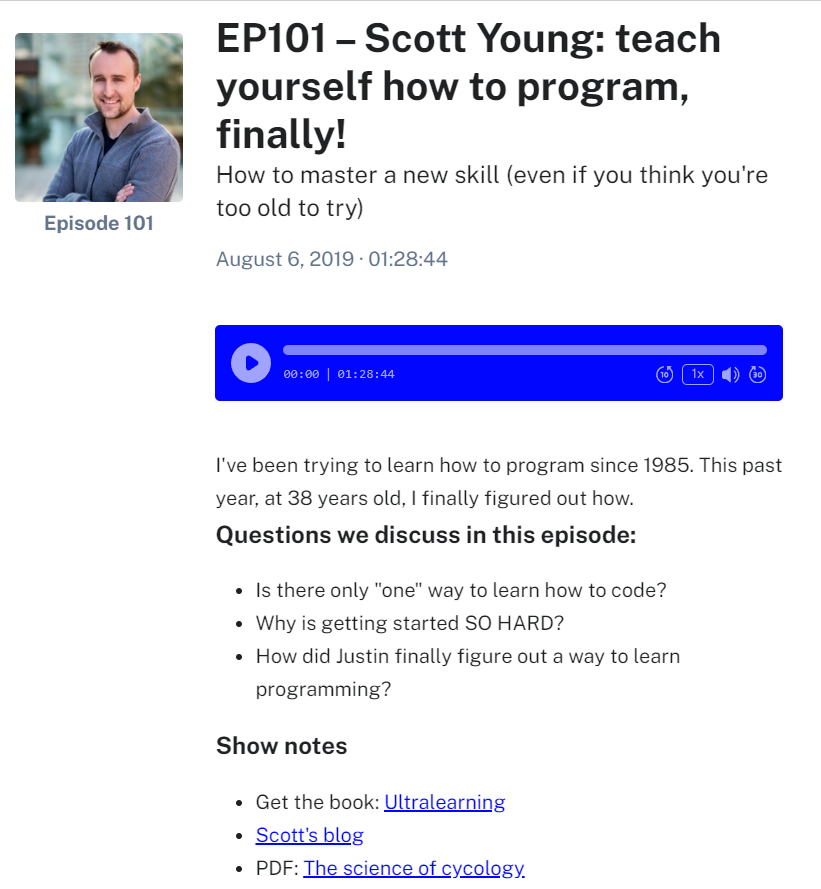
Benefits Of Appearing On A Podcast
There are a few good reasons why you should consider appearing on podcasts as a link-building strategy.
First, compared to other tactics, it doesn’t require a lot of time or resources.
Let’s assume an episode takes 60 minutes to record. Add another 60 for preparation. That’s much less than writing a guest post or a comprehensive guide for your blog. Or even creating an infographic.
And each episode may bring more than one link. For example, if it resonates with the listeners, they may link back to it from their websites or social media posts.
There’s more:
When you're featured on a podcast, you're not just getting a backlink. You're getting exposure to a whole new audience.
And guess what? Many of those listeners are going to be curious enough to check out your website. So, podcast appearances can drive significant referral traffic.
We're talking about engaged listeners who are actively interested in what you have to say and can become customers.
And let’s not forget that appearing on podcasts makes you look good. It positions you as an expert in your field.
This can lead to more opportunities in the future like invitations to speak at events. Or take part in other podcasts.
The biggest upside of podcast link-building is the dual payoff in both SEO and brand authority. A well-placed link from a reputable podcast can significantly boost your search engine rankings while simultaneously positioning you as an industry expert. This dual benefit is hard to come by through other link-building methods; making podcasts a goldmine for savvy marketers.
Drawbacks Of Appearing On A Podcast
I know what you're thinking: "This sounds too good to be true.”
Well, you're right. Like any strategy, podcast link building has its downsides.
First, the link isn’t always guaranteed.
And it isn’t because the host refuses to include it but because the podcast platform doesn’t allow it. Spotify and Apple Podcasts, the two most popular platforms with a total listener share of around 70%, don’t. So, even if the link is included in the show notes, it doesn’t pump any juice.
And the links from their own websites may move the needle that much.
Moreover, this tactic only works if you’re already recognized in your space or at least have some achievements behind your belt. Getting featured without those is nearly impossible - definitely not on the most popular podcasts.
How to Do Podcast Link Building
Now that we've covered the ‘what’ and ‘why’ (and why not), let's get into the ‘how’ of podcast link-building.
Here's your step-by-step guide to the process.
Find podcasts in your niche
First, you need to find podcasts in your niche that align with your expertise and target audience. With 4.2 million active podcasts, this shouldn’t be difficult.
Here’s how I do it.
1) Use podcast platforms
One way to do it is through the streaming services and podcast platforms. If the podcast has a significant audience, it’s most likely to be there.
Search for the keyword that best reflects your expertise and see what comes up.
As mentioned, these platforms don’t allow clickable links, so use Google to check which of the websites have their own page or are hosted in podcast directories where linking is enabled.
2) Google Search
Alternatively, you can skip streaming platforms and search for industry podcasts directly via Google.
Let’s say you’re looking for product management podcasts.
Simply search for 'best product management podcasts’ or ‘agile podcasts,' and you’ll find lots of listicles and Reddit threads (of course) with well-known podcasts.
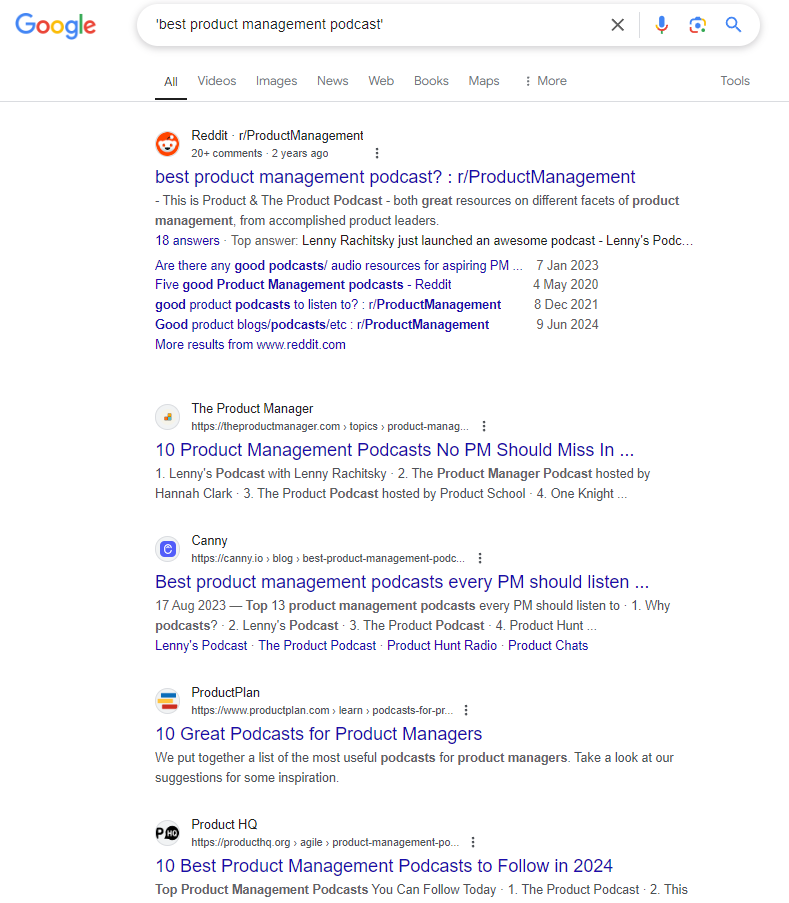
3) Competitor analysis
Is one of your competitors really good at securing podcast appearances?
Yes?
X-ray their website for the podcasts that have linked back to them.
Here’s how to do it in Ahrefs.
- Search for competitor’s domain in Site Explorer. Set the search settings to Exact URL.
- In the Backlinks report, filter the results by ‘episode’ in the Ref. page title.
- Export the results into a spreadsheet and remove sponsored shows/episodes from the list.
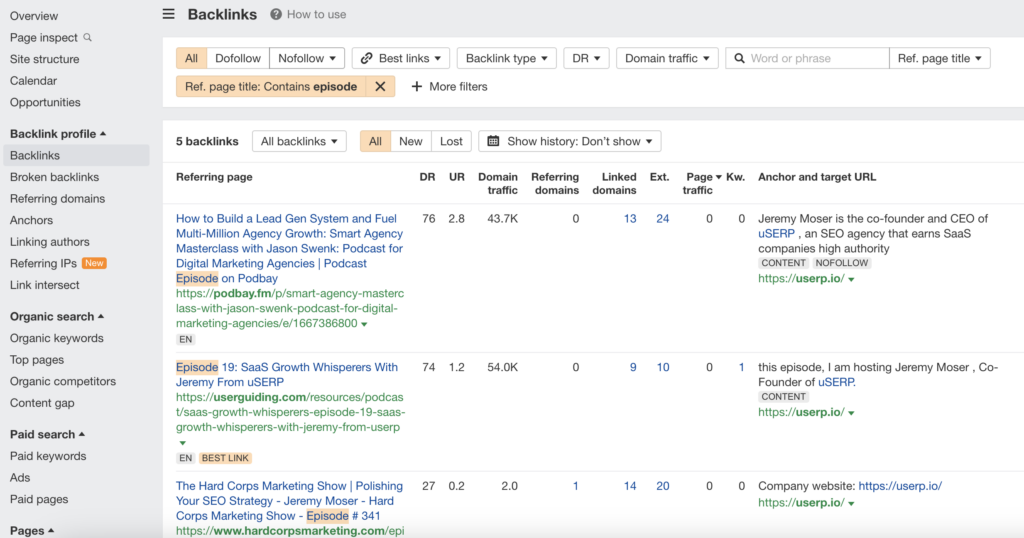
Awesome link-building and SEO podcasts
If you’re in the link-building and SEO space, we’ve got a little something for you. A curated list of 12 top-notch podcasts in the industry. To save you time.
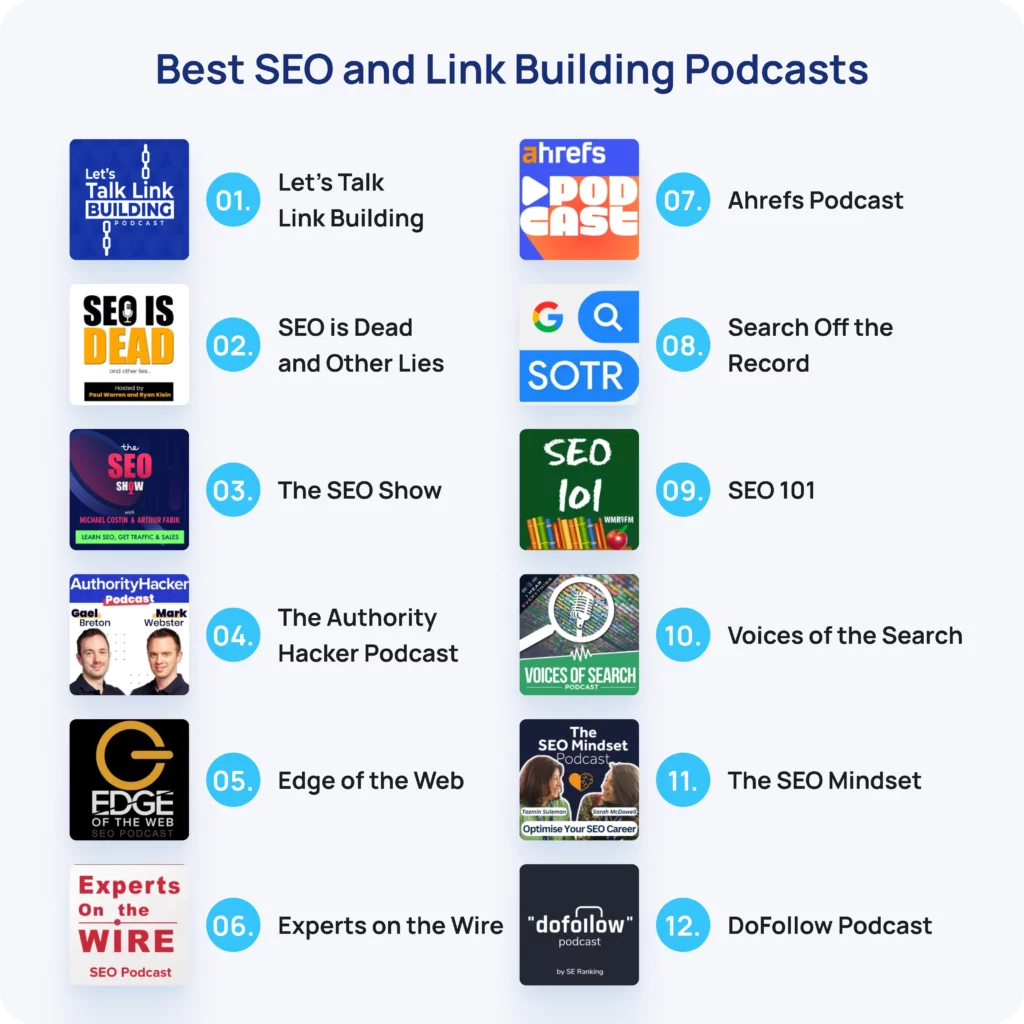
- "Let's Talk Link Building" by Aaron A
- "Experts On The Wire" podcast hosted by Dan Shure
- "The SEO Mindset" - hosts are Tazmin Suleman
- "SEO is Dead and Other Lies" - Paul Warren & Ryan Klein
- "The Authority Hacker Podcast" by Gael Breton & Mark Webster
- "Voices of Search" hosted by Benjamin Shapiro
- "EDGE of the Web" - by Erin Sparks
- "Search Off the Record" - from Google's Search Engine Relations team
- "SEO 101" - by Ross Dunn & Scott Van Achte
- In "The SEO Show", hosts Michael Costin & Arthur F.
- "Ahrefs Podcast" hosted by Tim Soulo
- "DoFollow Podcast" by SE Ranking
Select the criteria
Not all podcasts are worth the effort, so once you have a prospect list, it’s time to vet them.
What criteria should you use?
1) Is the podcast active? If the podcast episodes are irregular or there hasn’t been one for a while, they’re unlikely to have a healthy audience. And you might not even be able to track down the owner.
2) Does it offer backlinks? If the podcast doesn’t offer links or their provider doesn’t allow it, the SEO benefits will be limited. You will still increase your online presence, though; sometimes, it may be worth the effort.
3) What’s the Domain Rating (DR)/Domain Authority (DA) of the podcast website? The higher the metric, the more equity the link passes. As we’re after high-quality backlinks, this is the ultimate criterion.
Ahrefs Batch Analysis allows you to check up to 200 sites at once. This is the quickest way to rank the podcasts based on their metrics.
4) What’s the quality of the podcast? You can quickly figure it out by looking at the caliber of the guests they feature. Do you want people to associate you with this lot?
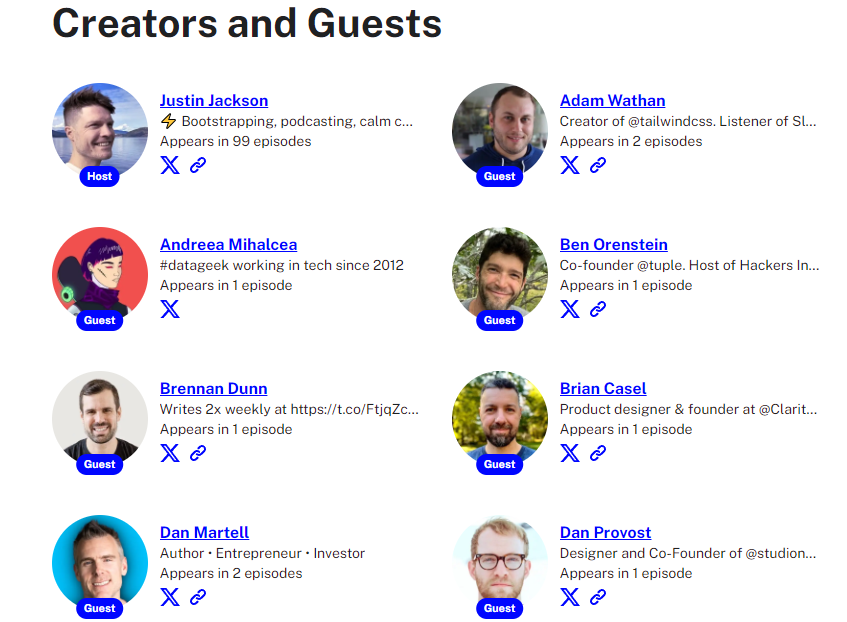
Start pitching
OK, so you’ve picked the podcasts you’d like to appear on? Sweet!
You’re ready to pitch them.
Some of them, like Bean Ninjas, make it really easy for you by providing an application form.
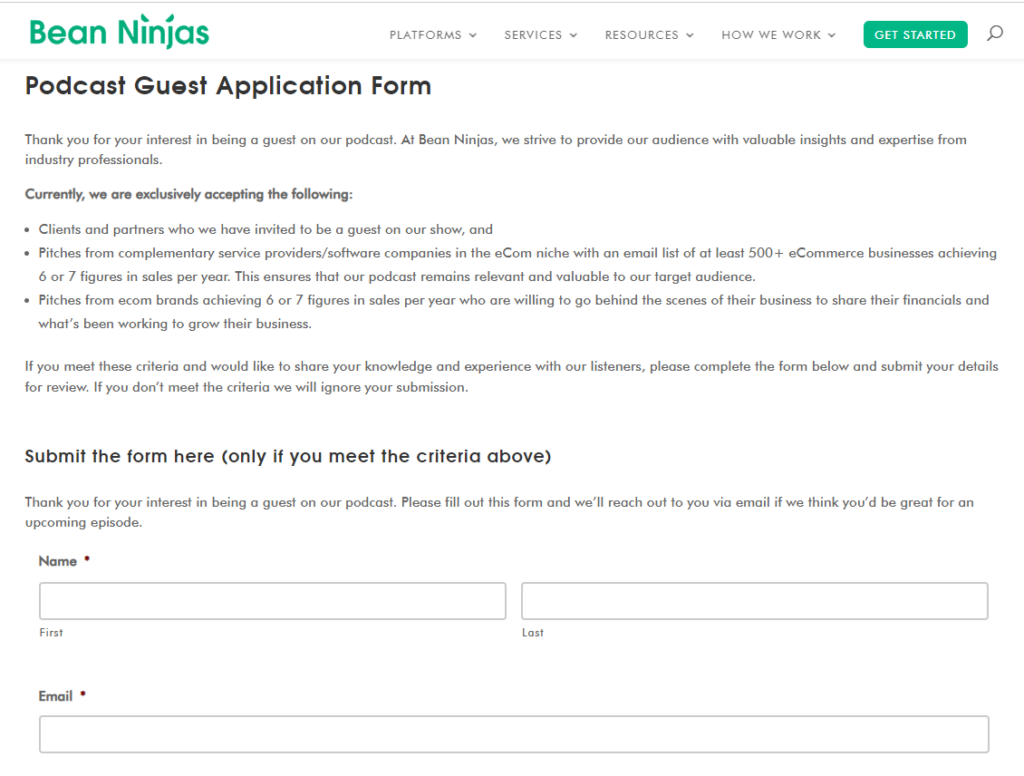
See how they outline their criteria and the application process?
Follow them religiously.
If there’s no such page, you must identify the person running the show, find their email address, and prepare your pitch.
What to include in the email?
- Introduce yourself and your work.
- Explain why you’re a good fit for the podcast: highlight your achievements and their relevance to the target audience.
- Suggest the topic you want to discuss: Something that hasn’t been covered yet and something that you know enough about to provide engaging and stimulating input. Is there something you’ve already written that the audience would find interesting?
Here’s a template. Feel free to adapt it to your needs.
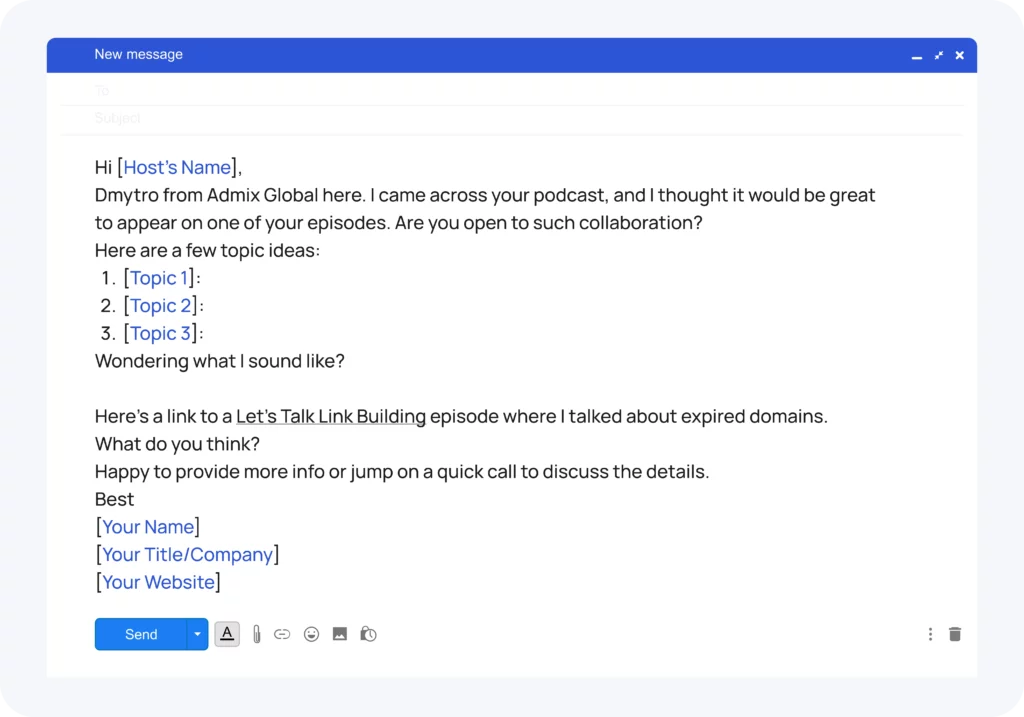
Prepare for the Podcast Interview
Landed a podcast interview? Congrats!
Now what?
First, research it a bit more detail.
Listen to a few episodes to get a feel for the show's style and tone. Try to learn as much as possible about the host and find common ground you can use to build rapport.
Next, prepare 3-5 main points you want to get across. These should be valuable insights that the audience will find useful.
Don’t reinvent the wheel, though. Lean into your existing content.
Finally, put yourself in the host's shoes and anticipate questions. Or have a chat with them and agree on the key questions to discuss.
And prepare concise, engaging answers. Think about stories to illustrate the key points. They resonate with listeners like nothing else.
Record the podcast
It’s showtime!
This is the fun part.
Here are a few things to remember:
- Find a quiet space with a good internet connection.
- Get a good-quality microphone. If you’re going to do it regularly, it might be worth investing in a dedicated podcasting microphone. And a decent webcam if it’s a video interview (some podcasters share them on their YouTube channels).
- Enjoy it!
Promote the Podcast
Podcast recorded? Well done.
Your job isn't done when the podcast ends, though. Instead of relying on the host to do all the promotion, leverage your network to spread the word.
As soon as the episode drops, share it across all your social media platforms. LinkedIn, X, Facebook, you name it. Tag the podcast and the host for extra visibility.
Don’t stop there. Repurpose the podcast for other platforms:
- Write a blog post summarizing your key points from the podcast.
- Turn key quotes into social media graphics.
- If the podcast was video-recorded, create short video clips for YouTube, TikTok, and Instagram (and any other platform that your audience uses).
Track podcast success
I’ll be honest with you: tracking the impact of the podcast on your SEO strategy is tricky.
That’s because it’s very difficult to attribute a potential increase in your website traffic or SERP performance to a particular podcast episode.
There are a few things you can do, though:
- Add a UTM parameter to the link to track the referral traffic.
- Use social listening tools to track the podcast episode mentions.
- Monitor the engagement with the social media content promoting the podcast.
Alternative Ways to Leverage Podcasts for Link-Building
Being a podcast guest is just one way to use them for your link-building campaigns.
Here are two more.
Sponsor a podcast
Sponsoring a podcast is more transactional than appearing on one.
The deal is simple: you pay the hosts to promote your product or service by mentioning it during the show, in the notes, and on their websites.
The process is very similar to how you build links through podcasts ‘organically’:
- Look for podcasts in your niche with audiences that could be interested in your product.
- Vet them using similar criteria. Plus one more: it needs to be within your budget.
- Pitch to the hosts.
- Monitor the inbound links acquired and the referral traffic.
Host your own podcast
Hosting a podcast can attract backlinks to your website in two ways.
First, your guests will most likely link back to it and share it with their audiences, increasing your visibility.
Second, it can attract traffic organically, especially if you feature well-known guests from your industry. For example, the Product People episodes I mentioned above have earned 483 links. Not too shabby!
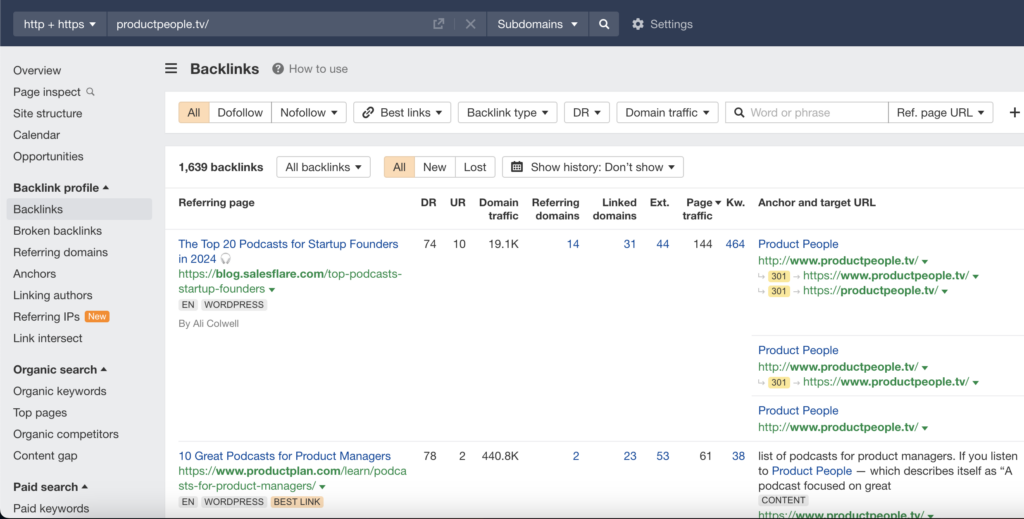
By hosting a podcast, you’re in the driver’s seat: You decide the content, guests, and how to promote your website.
It also gives you lots of valuable content that you can repurpose as blog posts and social media posts to expand your reach further. And in the long run, it can help you establish yourself as a go-to resource in your niche.
You can even monetize your podcast through sponsorships and affiliate programs.
The downsides?
Hosting the podcast is resource-intensive, and the results don’t come overnight. Building a reasonable audience that would make your podcast attractive to reputable guests and sponsors takes years.
Final Words
Podcast link-building is definitely worth a shot if you have enough expertise to share and are comfortable talking about it. It requires fewer resources than other strategies like guest posting and can help you get your company in front of audiences who prefer audio content.
However, some of the benefits, like increased exposure, are very difficult to attribute or track. You may also find that there aren’t that many quality podcasts in your niche that would be open to featuring you, especially if you’re only starting in the business.
That’s why I wouldn’t rely on podcast link-building as the primary tactic. Instead, use it as just one of many elements in the puzzle.
Want to learn more about incorporating podcast link-building into your SEO strategy?
Get in touch with the Editorial.Link team!


